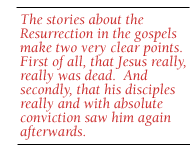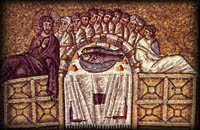Death and Resurrection
The climax of Jesus' story - his death and resurrection - becomes central to evolving Christian faith. But, each gospel tells it differently.William Goodwin Aurelio Professor of the Appreciation of Scripture, Boston University
THE CRUCIFIXION AND RESURRECTION IN THE GOSPELS
 We don't have that much detail about the actual crucifixion of Jesus. What we
have are the stories in the gospels. And, interestingly and appropriately, the
gospel writers are drawing on Psalms. Psalms that in the Jewish canon are
often cries to God. They're grabbing onto that literature to shape their
narrative presentation of the crucifixion. I wouldn't put much confidence in
the narrative details. You know, if there were somebody who was going to
pierce Jesus' side or if there were somebody who were gambling for his cloak
... that kind of thing. But I like to attend to the tone... [that] the
dependence on the Psalms suggests. Because those are cries of terror and
loneliness. They're really appeals to God for meaning. While they're words
that are put in Jesus' mouth in Mark, "Why have you forsaken me?" It's the
religious power of the Psalms that is really one of those wonderful moments of
concrete continuity between what this very passionately religious first century
Jew might have been thinking as he was dying this horrible death on the cross,
as the finale to this week of passionate religious excitement and commitment.
And asking God what happened.
We don't have that much detail about the actual crucifixion of Jesus. What we
have are the stories in the gospels. And, interestingly and appropriately, the
gospel writers are drawing on Psalms. Psalms that in the Jewish canon are
often cries to God. They're grabbing onto that literature to shape their
narrative presentation of the crucifixion. I wouldn't put much confidence in
the narrative details. You know, if there were somebody who was going to
pierce Jesus' side or if there were somebody who were gambling for his cloak
... that kind of thing. But I like to attend to the tone... [that] the
dependence on the Psalms suggests. Because those are cries of terror and
loneliness. They're really appeals to God for meaning. While they're words
that are put in Jesus' mouth in Mark, "Why have you forsaken me?" It's the
religious power of the Psalms that is really one of those wonderful moments of
concrete continuity between what this very passionately religious first century
Jew might have been thinking as he was dying this horrible death on the cross,
as the finale to this week of passionate religious excitement and commitment.
And asking God what happened.
 So, did Jesus stay dead?
So, did Jesus stay dead?
Of course the story doesn't end on the cross. The story ends, at least in Mark, the earliest gospel, with the mysteriously empty tomb. We get followers of Jesus who rested on the Sabbath ... again, one of those little inconspicuous details, if had been preaching against the Sabbath, why would they have rested on the Sabbath? They could have gone and visited the body on Saturday. But they don't. They wait until Sunday morning. And the tomb is empty. The Gospel of Mark ends with women being told by a mysterious young man that Jesus is waiting for them and for the disciples in Galilee. And... they don't say anything because they're terrified. That's where the gospel ends.
In Matthew and then in Luke, there are elaborate post-resurrection appearances. Jesus appears to his disciples in the Galilee, in Matthew, and in Jerusalem, in Luke. And gives instructions in some detail about what the disciples are supposed to do now.... The resurrection is packaged in a sense, in the gospels; the reader has been prepared for it because Jesus has been predicting his own resurrection clearly, consistently throughout all these gospels. What's interesting, if you can hear the disharmony behind the very smooth presentation, is that Jesus' death was extremely traumatic. Even though the disciples have gotten quite detailed predictions of what's going to happen, they're terrified, and they run and they abandon him. He dies alone. And then you get this moment of resolution where nonetheless, they're all brought back together around the triumph of the risen Lord. But, it's hard, on the basis of the story that we get in the gospels, [to] peel back behind that and understand what these initial resurrection appearances would have been like to the Apostles.
 As a historian, what do you make of this ... the resurrection, of this
shared conviction that Jesus had come back from the dead?
As a historian, what do you make of this ... the resurrection, of this
shared conviction that Jesus had come back from the dead?
The stories about the Resurrection in the gospels make two very clear points. First of all, that Jesus really, really was dead. And secondly, that his disciples really and with absolute conviction saw him again afterwards. The gospels are equally clear that it's not a ghost. I mean, even though, the raised Jesus walks through a shop door in one of the gospels, there he suddenly materializes in the middle of a conference his disciples are having, he's at pains to assure them, "Touch me, feel me, it's bones and flesh." In Luke he eats a piece of fish. Ghosts can't eat fish. So what these traditions are emphasizing again and again is that it wasn't a vision. It wasn't a waking dream. It was Jesus raised.
Now, as an historian, this doesn't tell me anything about whether Jesus himself was actually raised. But what it does give me an amazing insight into, is his followers, and therefore, indirectly, into the leader who had forged these people into such a committed community. The idea of resurrection, the idea of the vindication of a righteous person, is something that again, is an element [in] a known catalog of elements that we can construct for Jewish apocalyptic hope. If Jesus hadn't been talking about a Kingdom of God, if he hadn't said anything about God triumphing over evil, it would really be miraculous to have his disciples suddenly be convinced that he himself had been raised. But they are convinced of that. In other words, the commitment to the belief that Jesus had been raised is the index of the apocalyptic commitment on the part of his followers. And in that sense, like looking in a rear view mirror, I think the resurrection stories, which are at the core of the proclamation of Christianity, the resurrection stories, give us an indirect view of what the historical Jesus would have been saying.
Professor Emeritus of Religious Studies DePaul UniversityTHE CRUCIFIXION IN THE GOSPELS
Now, as Jesus hangs on the cross, can we say what was in his mind? Is there any significance in what he said while was hanging on the cross? What scraps of evidence are there that can tell us something about him and how he died?
When you say crucifixion, you say immediately, two things. Lower class, because the Romans were not in the custom of crucifying upper class. That was too dangerous. People might get ideas when they saw that aristocrats died just like everyone else. So, lower class and subversion. It tells us that Jesus was perceived, at least by his executioners, as a lower class subversive. And that's very important. The details of the last words of Jesus, for example, we're totally in the realm of gospel, and not of history. Mark tells us that Jesus died being mocked and in agony and I think Mark is writing for the experience of people in the 70's who are dying like that and who need the consolation that Jesus had died that way before, feeling abandoned by God. When you come to John, you have a totally different scenario. Jesus dies when he's good and ready. His last words are to fulfill the scriptures. When that is done he gives up his spirit. There is no mockery, of course. There really is no agony. There almost is no pain. These are different gospel visions of the brute historical fact that Jesus would have died in agony on the cross....
DIFFERENT GOSPELS, DIFFERENT ENDINGS
The story of the empty tomb is found, as best as I can discern, only in Mark. The last chapter of Mark's gospel, Mark 16, tells the story of Easter Sunday morning [when] the women come to the tomb. They find it open and empty. It's a tomb with a huge rolled stone in front of it. It's open and it's empty. And there is a young man, a transcendental being of some kind, let's say an angel, in the tomb who says, "Jesus is risen. He is not here." That's the story. He also says, however, "Go tell the disciples." And... the women flee and tell nobody what happened. Now, that's an extraordinary ending. Not extraordinary because of the empty tomb, but because the women tell nobody. So, you might well wonder how, then, Mark even knows the story. That's where Mark ends his gospel. It ends there. There are no apparitions. There are no visions. There is simply that scene. Where does it come from? I cannot find it in any source earlier than Mark, or in any source that is not dependent on Mark, in my judgment. But it makes eminent sense to me as the conclusion of Mark's gospel. He is writing in the 70's for a persecuted church.... He ends almost with an absent Jesus, because that's what his community has experienced in persecution, an absent Jesus. Now, nobody after Mark is going to accept that. Matthew will change it. Luke will change it. John will change it. The scribes will even change the Gospel of Mark to put other endings there. Mark creates the empty tomb, as far as I can see, as his way of ending the story....
As I interpret Mark, Mark himself is the creator of the story of the empty tomb. And everyone else - let's take an example, Matthew - Matthew is reading Mark. There's a massive consensus of scholarship on that. He finds that Mark ends with the women fleeing and telling nobody. Is that the way Matthew tells it? No. He has Jesus meet the women. And now the women, then, go and tell.... And the last scene in Matthew, of course, is Jesus, who meets the disciples on a mountain in Galilee where the story began ... that's the Sermon on the Mount, and they're told to go out and preach to the world. That's Matthew's changing of Mark. And it's quite sensible. It's almost what you would guess Matthew would have to do...
Now when Matthew and Luke effectively tack on a new ending, are they just writing pure fiction, or are they relying on some kind of oral tradition that's going around the movement?
I don't invoke oral tradition where I have no evidence for it. Oral tradition is the cunning and marvelous explanation of anything we don't understand. As far as I can see, Matthew is creating the appropriate ending, the almost predictable ending for Matthew's gospel. So does Luke. So does John. They had to be conscious of exactly what they were doing ... that Matthew was saying to himself, "I have to conclude this gospel. I'm talking about something that happens, say in the year 30, but I have to bring my gospel up to the year 85. Now, what's the last climactic statement of Jesus? Where do I locate it and what does he say and to whom?" And all of that, each gospel writer does differently and they had to be conscious that they were creating. Now, they do not create it simply as a pure fiction. They create it as an appropriate summary climax to their gospel....
